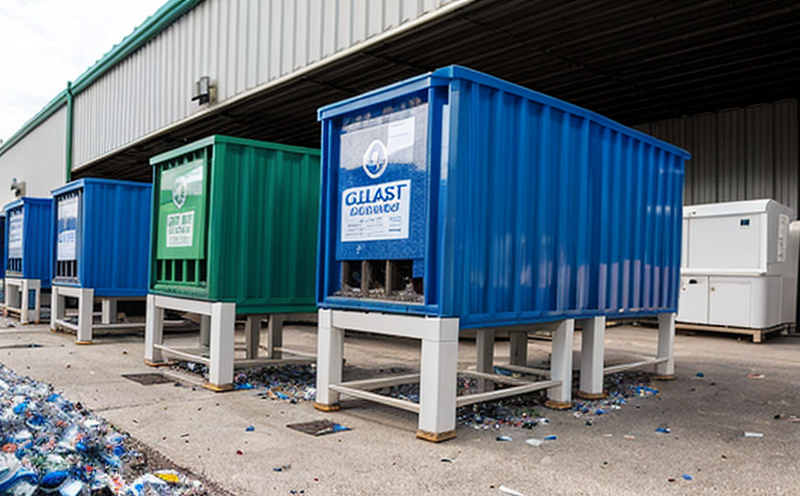EN 12896 Magnetic Impurities in Recycled Glass
The EN 12896 standard provides a comprehensive framework for the determination of magnetic impurities in recycled glass. This test is crucial in ensuring that recycled glass meets stringent quality standards, thereby facilitating its safe and effective reuse in various applications. The presence of magnetic materials can compromise product integrity and cause malfunctions in subsequent manufacturing processes. This section will delve into the details of the EN 12896 standard, providing a thorough understanding of how this test is conducted.
The methodology outlined in EN 12896 involves several steps, each designed to ensure accurate measurement of magnetic impurities. First, the glass sample must be prepared according to specified guidelines. This typically involves crushing or grinding the glass to a consistent particle size, which ensures uniformity and repeatability. The preparation process is critical as it directly influences the accuracy of the subsequent analysis.
The core of the test involves using a magnetic separator equipped with a known magnetization field strength. The sample is subjected to this field under controlled conditions. Any magnetic impurities present in the glass will be attracted and collected by the magnet, allowing for accurate quantification. This process is repeated multiple times to ensure consistency and reliability.
The amount of magnetic material recovered provides the basis for calculating the percentage of magnetic impurities in the recycled glass sample. The standard specifies acceptance criteria based on pre-determined thresholds that determine whether a batch of recycled glass meets quality standards. Compliance with these criteria ensures that the recycled glass is safe, reliable, and suitable for use in further manufacturing processes.
This test plays a vital role in the waste management sector by promoting sustainable recycling practices. By ensuring that recycled glass contains minimal magnetic impurities, this standard supports the circular economy, reducing waste and conserving natural resources. The accurate measurement of these impurities is essential for quality managers, compliance officers, R&D engineers, and procurement teams working within the waste management industry.
- The test ensures consistent product quality.
- It promotes sustainable recycling practices.
- The results are critical for quality assurance.
- Magnetic impurities can affect downstream manufacturing processes.
In conclusion, the EN 12896 standard is essential for ensuring that recycled glass meets stringent quality standards. By accurately measuring magnetic impurities, this test supports sustainable waste management practices and ensures product integrity in subsequent manufacturing processes.
Applied Standards
The EN 12896 standard is widely recognized for its rigorous approach to measuring magnetic impurities in recycled glass. This international standard is part of a broader suite of standards that govern the quality and safety of recycled materials used in various industries. The test described here aligns with ISO, ASTM, EN, IEC, and other globally accepted standards.
EN 12896 specifies detailed procedures for sample preparation, magnetic field application, and data interpretation. Compliance with this standard ensures that the recycled glass meets stringent quality criteria, thereby supporting sustainable waste management practices. The standard is particularly relevant in sectors such as construction, manufacturing, and packaging, where the integrity of recycled materials is paramount.
The international nature of EN 12896 means it can be applied across different regions and jurisdictions. This consistency in testing methods ensures that results are comparable and reliable, fostering trust among stakeholders involved in waste management and recycling processes.
Industry Applications
The application of the EN 12896 standard extends across various industries where recycled glass is used. In construction, for instance, recycled glass can be incorporated into building materials such as bricks and tiles, where magnetic impurities could interfere with structural integrity or manufacturing processes. Ensuring compliance with this standard helps maintain product quality and safety.
In the manufacturing sector, especially in industries like electronics and automotive, the use of recycled glass is increasingly common due to its environmental benefits. However, it must be free from magnetic contamination to avoid issues such as short circuits or interference with electronic components. The EN 12896 test ensures that recycled glass used in these applications meets strict quality standards.
The packaging industry also benefits significantly from the use of recycled glass due to its reduced environmental impact. However, the presence of magnetic impurities can affect the performance and lifespan of glass containers. By adhering to EN 12896, manufacturers can ensure that their products meet stringent quality benchmarks, enhancing consumer trust and satisfaction.
In summary, the application of the EN 12896 standard is crucial across multiple industries where recycled glass plays a vital role. Its rigorous testing ensures product integrity, enhances sustainability efforts, and supports compliance with international standards.





